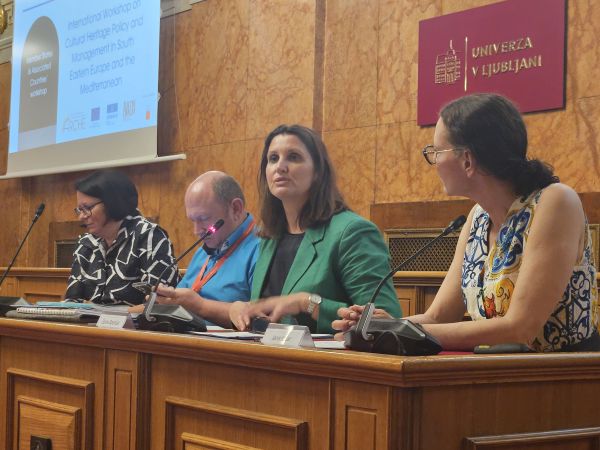On 3–4 June 2025, the University of Ljubljana hosted the international workshop “Connecting Southeast Europe and the Mediterranean: ARCHE in Collaboration with the SMACH Forum”, bringing together over 70 experts, policymakers, and professionals in cultural heritage. Co-organised by the EU-funded ARCHE project and the SMACH Forum, the workshop focused on aligning national and regional strategies with European cultural heritage research and policy frameworks.
The event opened with welcoming remarks from prof. dr. Gregor Majdič (Rector, University of Ljubljana), Mr. Gašper Hrastelj (Slovenian UNESCO Commission), and distinguished representatives from the European Commission, French Ministry of Culture, and the Government of Egypt. The round of introductory addresses was concluded by Dr Aleš Musar, husband of the President of the Republic of Slovenia.

From left to right: prof. dr. Abdelrazek Elnaggar, prof. dr. Irena Lazar, Mahmoud Yehai (Egyptian Counsellor), prof. dr. Mamdouh Eldamaty, H.E. Ms. Nahla Elzawahry (Egyptian ambassador), prof. dr. Hany Helal, Aleš Musar, prof. dr. Abdelhamid ElZoheiry, prof. dr. Pascal Lievaux, prof. dr. Matija Strlič
The agenda included roundtables with representatives from multiple Slovenian ministries, the Croatian government, and international organisations, underscoring the importance of the “whole-government approach” to cultural heritage. Notable speakers included representatives of UNESCO, Cairo University, the Museo Egizio, and MIT. Their contributions underlined the importance of cross-border collaboration, equitable mobility of researchers, and shared governance in shaping resilient heritage policy.

First roundtable in the programme (from left to right): Dobravka Kalin, dr. Tomaž Boh, Špela Spanžel, dr. Jana Kolar
A standout feature of the workshop was its geographic reach: participants from 33 countries represented a wide spectrum of stakeholders—from ministries, universities, and research institutions to museums, NGOs, and international bodies. Slovenia accounted for the largest share (38.7%), followed by Egypt (11.3%) and Croatia (6.7%), illustrating the growing influence of Southern Mediterranean and Balkan countries in shaping European heritage agendas.
The event also served as a platform for presenting the Strategic Research and Innovation Agenda (SRIA)—a blueprint for the future EU Partnership for Resilient Cultural Heritage.
Organised in collaboration with the Slovenian UNESCO Commission, ZVKDS, University of Primorska, and the National and University Library, the workshop marked a key milestone in building an inclusive and strategically aligned cultural heritage research area in Europe.
The full programme of the workshop is available here.
